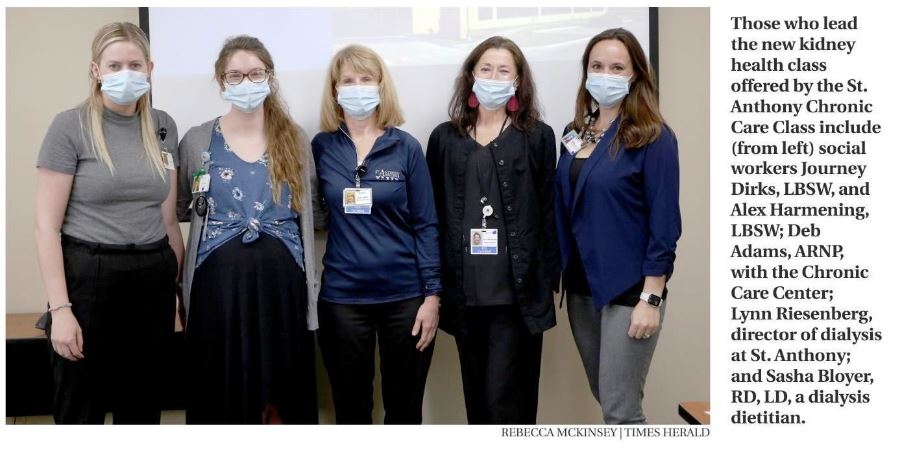posted
on 6/9/2021
in
Features
By REBECCA MCKINSEY r.mckinsey@carrollspaper.com Carroll Times Herald, June 8, 2021 HealthView
The Chronic Care Center at St. Anthony Regional Hospital is looking to answer some of the questions that come with this diagnosis with its new Kidney Health Education Class.
The class is tailored toward people who have been diagnosed with chronic kidney disease and are losing kidney function but are not yet at the point of needing dialysis. Typically, the class becomes relevant when people reach Stage 4 of kidney failure.
“Our goal is to keep the kidneys where they are and prevent progression into Stage 5,” said Deb Adams, ARNP, with the Chronic Care Center, during a recent class.
Currently involved in teaching the class are Adams; Lynn Riesenberg, director of dialysis at St. Anthony; Sasha Bloyer, RD, LD, a dialysis dietitian; and Alex Harmening, LBSW, and Journey Dirks, LBSW, both social workers.
 The class is a one-time, hour-long session offered once a month. It’s meant to provide initial information about chronic kidney disease and answer questions for people who are newly diagnosed. It seeks to create connections between people with kidney disease and providers with the Chronic Care Center so that those taking the class can follow up later if they have questions or are looking for additional information or resources, Riesenberg said.
The class is a one-time, hour-long session offered once a month. It’s meant to provide initial information about chronic kidney disease and answer questions for people who are newly diagnosed. It seeks to create connections between people with kidney disease and providers with the Chronic Care Center so that those taking the class can follow up later if they have questions or are looking for additional information or resources, Riesenberg said.
“What we’re doing is trying to help these people with their questions, but we’re also trying to help them to be as healthy as they can be to maybe help slow the progression of the kidney disease, like we would with a diabetic,” she said. “Similar to diabetes 2, we talk about diet and exercise.”
The class is covered by Medicare and might also be covered by some private insurance companies, Riesenberg said. Those interested should speak with their doctor or nephrologist for more information and a referral.
After explaining the basic functions of how kidneys work and what kidney disease looks like, the class covers practical measures people can use to slow the progression of kidney disease, including managing diabetes and hypertension, two of the leading causes of kidney disease.
“Part of controlling diabetes is preserving kidney function, and we work really hard to do that (at the Chronic Care Center),” Adams said.
The class also covers things to keep an eye out for when people are eating, as certain food items can exacerbate kidney problems. Bloyer recommended people with kidney disease meet one on one with a dietitian, as the best food choices will vary for each person. Those participating in the class also learn about other lifestyle recommendation such as quitting or cutting down on smoking.
As a part of the class, Riesenberg explains various dialysis options and educates those in the class about how they can prepare for dialysis prior to needing it.
Then, the social workers cover some of the other issues that arise for people with kidney disease, including transplants, creating a living will or medical power of attorney, cost of treatment and insurance options, and whether and how people with kidney disease can continue to work and participate in other activities.
“Common concerns people have are, ‘Can I keep working? Can I keep doing the things I love?’ ” Harmening said. “Yes — we encourage that. If you’re on dialysis, you can continue doing the things you enjoy and working.”
She noted that patients should consult with their doctors about specific restrictions they might have.
Those running the class emphasized that although following the guidelines and recommendations covered can help slow the progression of kidney disease, further progression still could happen.
“If it progresses, it doesn’t mean you did anything wrong,” Bloyer said. “It can just mean we did our best, but the kidneys are still wearing down.”
Those running the class invited participants to stay in touch and follow up with them as issues or questions arise. “We want to take the fear out of what could be in the future,” Riesenberg said.
“We want to alleviate some of the fear and tell them, ‘If down the road (your kidney function) does decrease, here’s your options. We’re just trying to educate them before they need to do more.”
She added, “Lots of people, when your primary care physician sends you to see your nephrologist, you don’t understand how kidneys fail or how the function decreases. We’re trying to explain the whys and how to help them work at their best for as long as we can, in a group setting, so they’re like, ‘Oh, I’m not the only one out here; there are people like me.’ ”
To contact the staff of the St. Anthony Chronic Care Center, please call (712) 794-5901.
Filter
- arnp
- chronic care center
- deb adams
- dialysis
- dietitian
- kidney
- nephrology